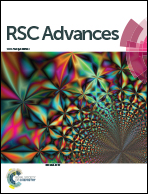Selective hydroformylation of alkyl acrylates using [2,2′-bis(dipyrrolylphosphinooxy)-1,1′-(±)-binaphthyl]/Rh catalyst: reversal of regioselectivity†
Abstract
The rhodium-catalyzed hydroformylation of alkyl acrylates with different P–N diphosphine ligands is investigated here. Under mild conditions (syngas pressure: 2 MPa, 20 °C), 2,2′-bis(dipyrrolylphosphinooxy)-1,1′-(±)-binaphthyl (L1) rhodium catalyst could give good conversion of ethyl acrylate (82.9%) in 12 h and exclusive branched aldehyde selectivity of >99.0%. More importantly, on elevating the temperature to 90 °C, this Rh system could preferentially afford the linear aldehyde with 96.1% regioselectivity, and the TOF could reach up to 9000 h−1. Deuterioformylation was conducted to explore the mechanism of regioselectivity reversal, and the results established that the reversible rhodium hydride addition to form the Rh-alkyl species might play a vital role in this reversal. The β-hydride elimination of branched Rh-alkyl species was comparatively stronger than that of linear ones under increased temperature, probably because L1 could cause comparatively larger steric repulsion in branched Rh-alkyl species under high temperature, due to its bulky and rigid binaphthyl backbone characteristics. In turn, the linear Rh-alkyl species progress to linear aldehyde was facilitated.
![Graphical abstract: Selective hydroformylation of alkyl acrylates using [2,2′-bis(dipyrrolylphosphinooxy)-1,1′-(±)-binaphthyl]/Rh catalyst: reversal of regioselectivity](/en/Image/Get?imageInfo.ImageType=GA&imageInfo.ImageIdentifier.ManuscriptID=C7RA01649B&imageInfo.ImageIdentifier.Year=2017)


 Please wait while we load your content...
Please wait while we load your content...